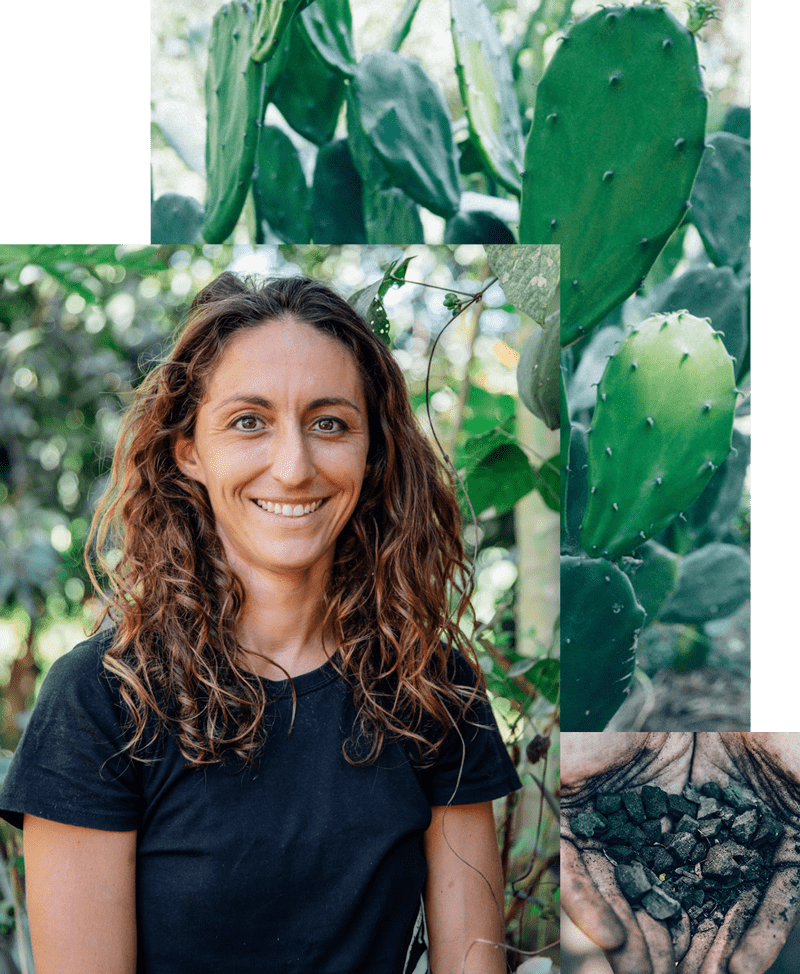
MEET A FARMER
Amanda Harris
Xolochiuhyan, Mexico
– Med Jones
Amanda Harris’ life is the result of saying yes to the unknown. This is a story of how the courage to do so changed everything. Not just for her, but for the 600 people who live in Juluchuca, Guerrero, Mexico – a small, rural community that rests between the Sierra Madre mountain range to the East and the sun-drenched rumbling Pacific Coast to the West.
The meaning of the town of Xolochiuhyan, (where Juluchuca derives its name), has various interpretations including “place to grow old” or “place of the ancient ones” to “place of the gourd” (important as a tool for collecting and storing water). Aztec records indicate this area provided tribute to the Aztec kings in the form of conch shells, salt, cacao and cloth made from locally grown cotton.
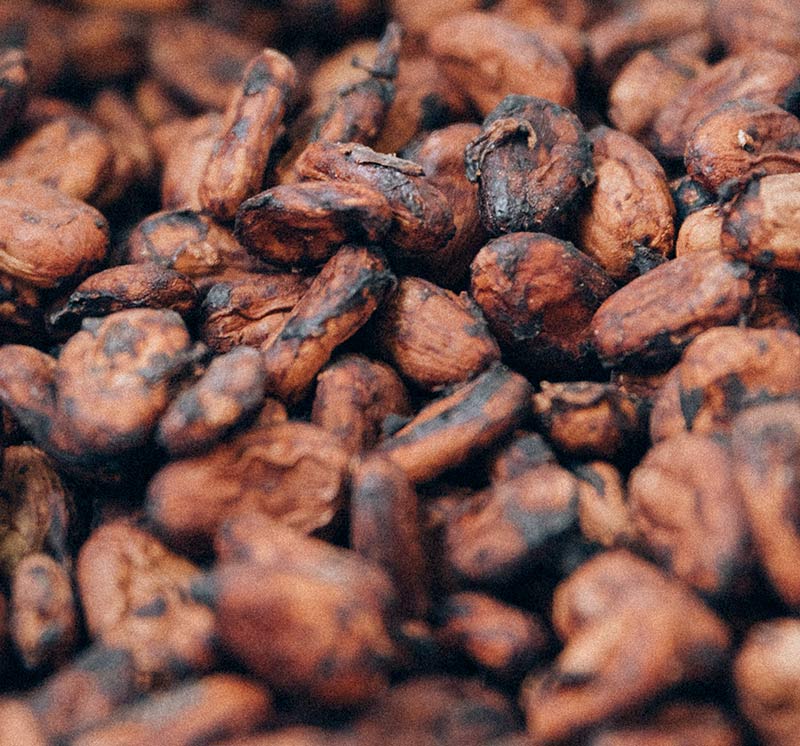
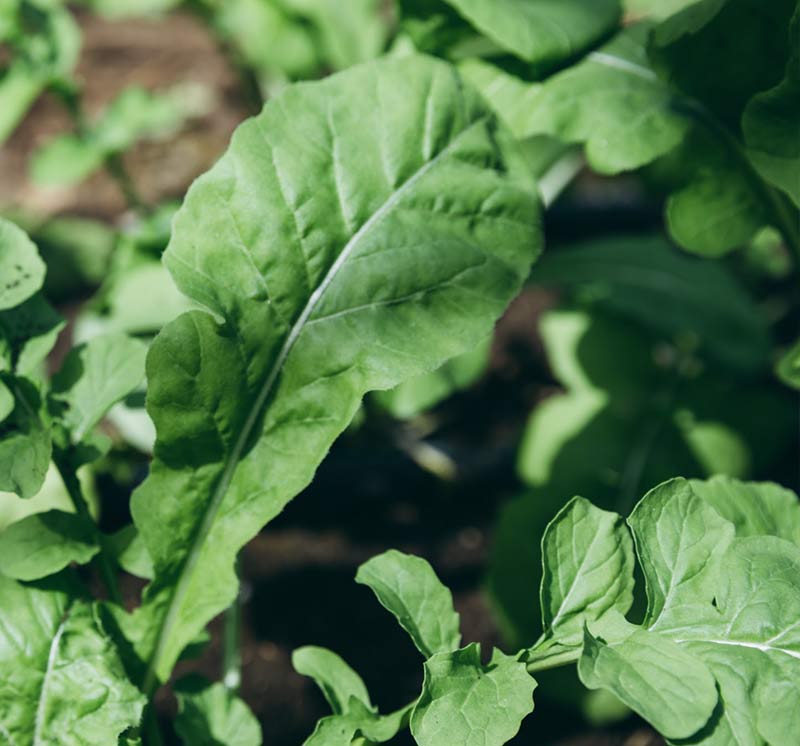
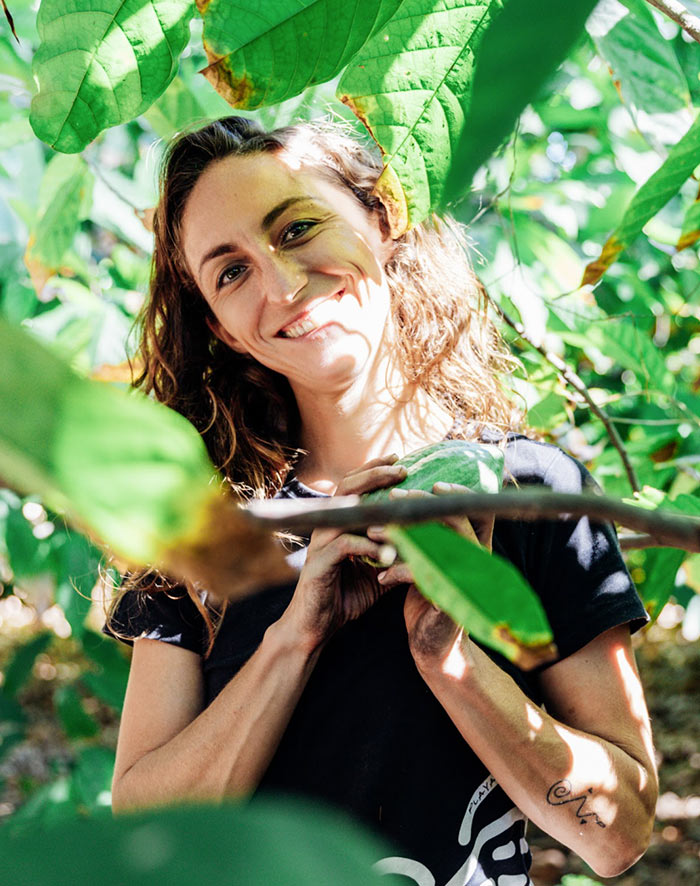
Landing in Juluchuca was never in Amanda’s plans. She dreamt of a similar place, and made calculated risks in her personal and professional career to get there, but could not have imagined she would actually be making a home in Southwest rural Guerrero, Mexico.
About 15 years ago, Amanda was on a fast track to a career in politics in Washington, D.C. Her degrees in Government and Politics, and Criminal Justice Reform helped her build networks and leverage relationships to address issues of social justice in Maryland and Washington, D.C.. She was passionate, deliberate, and radiated optimism. She believed she could and would help change the systems that limit educational opportunities and access to resources to the underserved communities where she grew up.
A little ahead of her time in Washington, D.C., Amanda felt stagnated by the lack of change in political and private sector circles. A professor friend of hers saw the frustrations brewing and offered Amanda an opportunity to conduct field research on ecological water systems in Western China. She felt called to the opportunity to break free from routine, observe and interact with rural communities in a new culture. She booked a flight to Asia, and the decision has shaped her life ever since.
It was here where she crossed cultural borders and broke down the mental barriers that prevent us from taking risks, stepping into the unknown, and talking to and learning from strangers.
AN INVITATION
TO LEARN & LISTEN
“I worked side by side with farmers and their families deep in the Himalayas of Nepal, in river communities in Myanmar and China, and in border towns in the North of Thailand. They used innovative techniques and technologies, as well as up-cycled resources and materials to solve their own problems. I learned that rural communities around the world are tasked with creating and building the systems necessary for survival when government resources do not reach them. It was in the field with resilient men and women where I realized the policy work I had studied in Washington, D.C. would not be my best tool to make a positive impact during my time in this world. It was happening right in front of me, at the ground level in rural agrarian communities, and that’s where I wanted to be.”
A year in Asia ended quickly and Amanda was contemplating what life she wanted to return to in Washington, D.C. She knew the reform work at home, but did not yet have a clear picture of what roads lie ahead, either.
the road less traveled?
“I made a choice, and what has become a personal commitment, to learn how to work, live, and have a positive impact inside rural communities in Latin America. I pursued graduate degrees in Global Environmental Politics and Natural Resource Management to understand how to forge pathways for private businesses, government programs, and rural communities to work together to solve basic and pressing issues.”
During her graduate experience in American University’s School of International Service, her coursework included a year of in-situ research in Costa Rica and Brazil. Her learning took place in the field, in non-traditional ways such as building ecological animal pastures with female farming cooperatives, consulting on disaster risk reduction strategies based in regenerative design principles with the Costa Rican government, and studying the impact the construction of highway BR-163 in Brazil’s Para state has on soil quality and agrarian livelihoods in the Amazon.
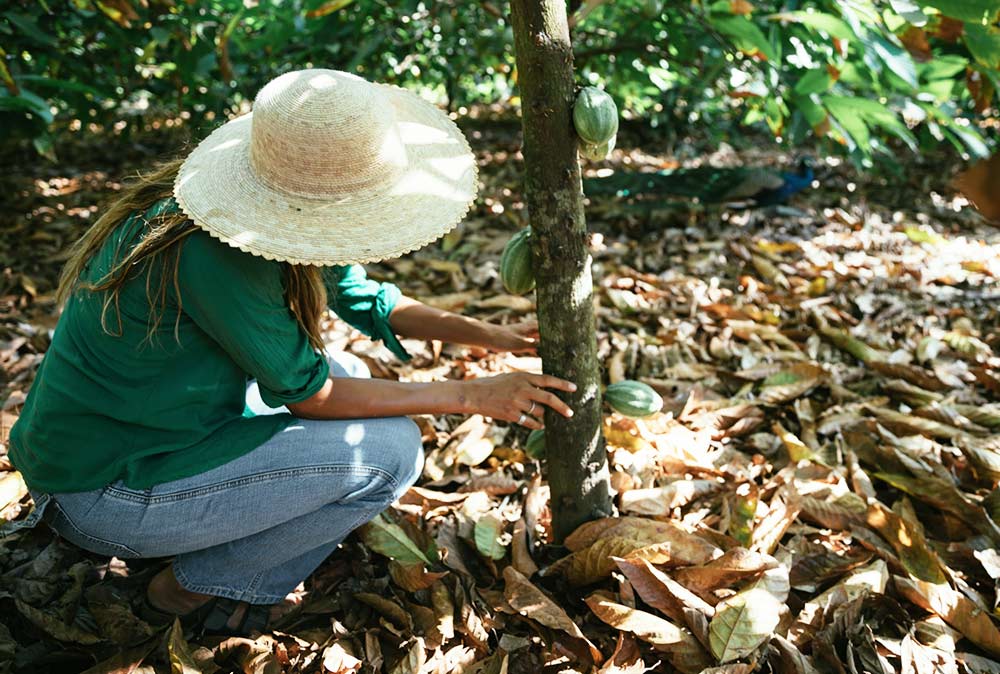
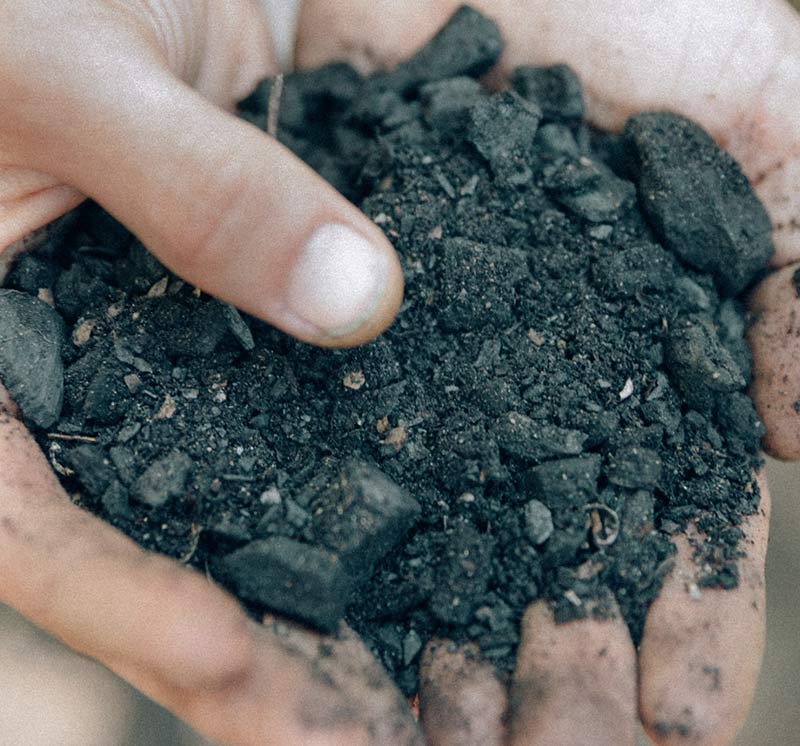
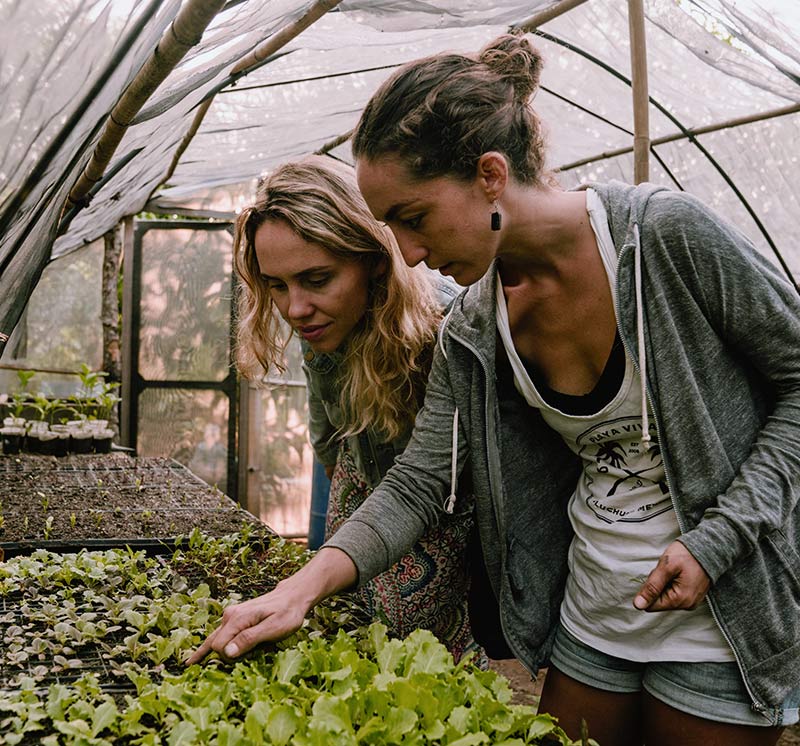
ARRIVING AT A CROSSROADS
After years of getting to know communities on the surface, Amanda decided it was time to make a long term commitment to a new project. She had just started to understand Latin culture and was certain she wanted to fully immerse herself in her work. For Amanda, that meant taking advantage of an offer as a Permaculture Specialist with Playa Viva, a Regenerative Resort in Juluchuca, Guerrero, Mexico. She hardly spoke Spanish before taking off, and was pleasantly surprised when she learned she was one of only two foreigners in town when she arrived.
“My background in agricultural theory and regenerative principles only compliment the generations of field and production experience that exist in this pueblo.” The intercambio, or equal exchange of ideas and information, to which Amanda credits her success, is rooted in building trust and opening the doors to lifelong friendships.
Today Amanda manages a 200 acre nature reserve under regenerative agriculture principles. The reserve includes citrus orchards, emerging food forests mangrove and estuary restoration, and animal husbandry systems. She also works to improve waste streams in the hotel and community with the help of local students who graduate her year-long, in the field, Permaculture program. She manages the grey and black water systems in and around the Playa Viva hotel, as well as the gardens that decorate the guest experience during their stay at the eco-boutique resort.
The focus is not on these elements themselves, but rather on the relationships created among them.
A NEW MODEL FOR TRAVEL: REGENERATIVE TOURISM
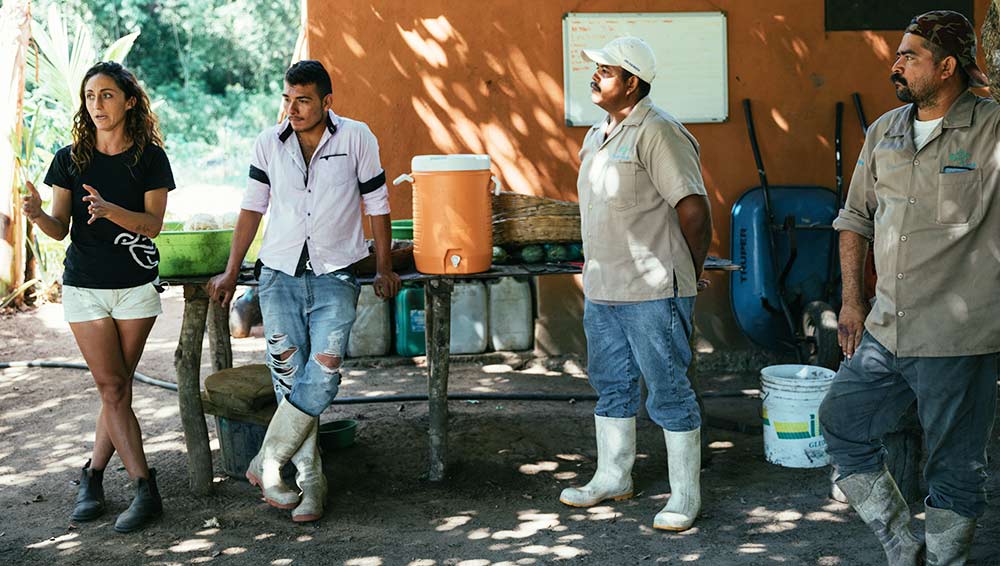
Amanda describes The Playa Viva farm as a living laboratory. It is a place for the six men that make up Amanda’s Permaculture Team to collaborate and think together, to sit on buckets and draw new designs in the dirt, and to find a classroom in Mother Nature. If it is something they are interested in, farm team members are encouraged to think through their own farm enterprises using the resources and education they receive on site. One of Amanda’s goals is to support her colleagues and team members so they can become self-sustainable, run their own businesses, feed their families, and create even more value for their community. This looks like conversations around slow money and local economies, exposing and informing local men on the needs and market options when working with high-end resorts and their clients, and identifying forgotten or devalued but nutrient-dense crops that have the potential to shift markets in Mexico.
INFUSION INSTEAD OF EXTRACTION
“Folks leave Mexico for seasonal agriculture work inside the United States. They head North with great knowledge around regenerative agriculture, only to grow large fields of monoculture crops with unlimited machinery and the constant burning of fossil fuels. They leave their families behind for six or nine months at a time, they live off fast-food and poor diets while growing food for a culture that is not their own. They do not really want to be there, but make the sacrifice for their family and the next generation.”
Inspired by her years of taking the unknown path, Amanda is working to help create a new future for the town of Juluchuca, with the guidance of the past. She knows food grows in abundance in her new community, and that men and women alike remember the days growing it. She works with her team to build rainwater harvesting systems to address problems of drought in the community, but also to begin the important conversations around water and agriculture. To date, the work is funded by Playa Viva and her guests, and today, Amanda is preparing her team for collaborations with new private business owners in the region and national government partners to generate income for the community using the natural resources that grow along the roads, rivers and hillsides of the town.
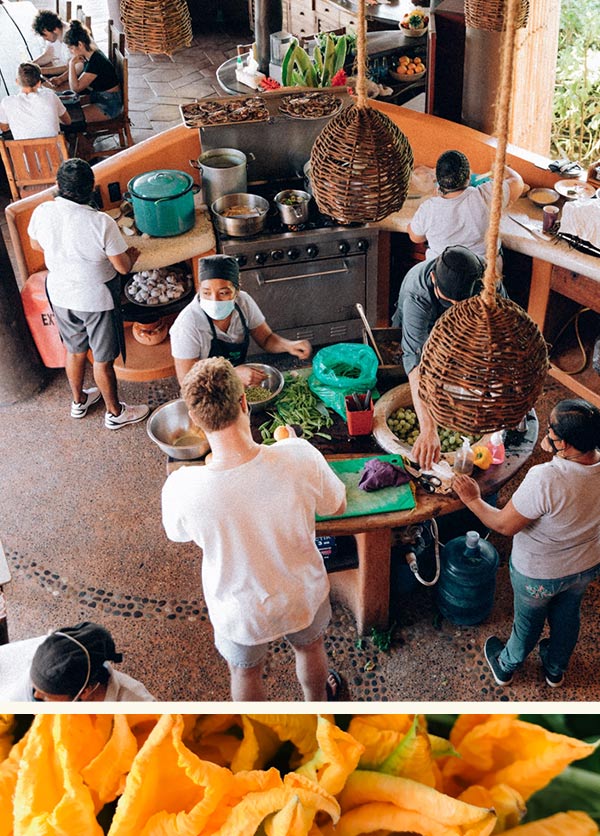
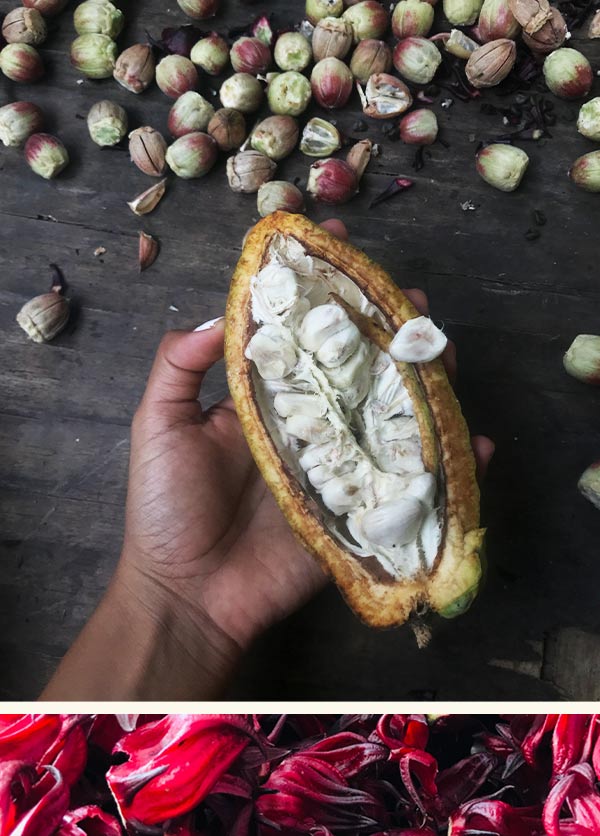
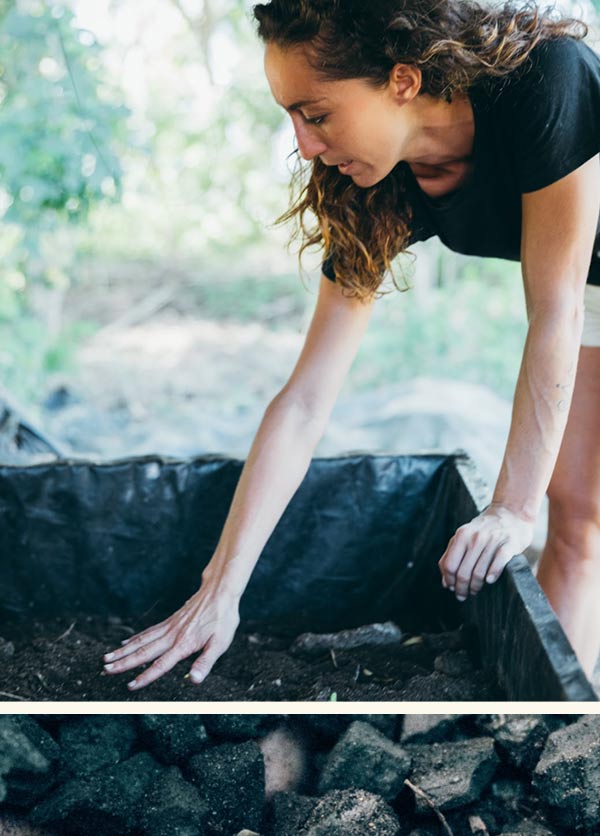
Regenerative agriculture creates opportunities for soil, water and communities around the world to flourish in ways we have not seen in generations. It brings people together on the land, in the field, or around a table sharing the abundance and connection with the Earth. Both at Playa Viva and through Permaculture projects in the community, Amanda and her team use Permaculture principles to ground their work. They are observing and interacting on a daily basis, learning how the systems they design can serve as carbon sequestration farming models for other parts of the country. They use and value renewable resources as well as capture and store energy in the form of large scale compost, solar electric fencing and panels for animals and the hotel, capturing rainwater and recycling grey and black waters back into the ecosystem where they live and work. The team is not afraid to move slow, recognizing that the learning they do comes from the processes and the conversations they have along the way, not always the end product.
APPLYING THE REGENERATIVE PROCESS TO YOUR LIFE
As you think about how to adopt some of these practices in your own life, land or community, Amanda recommends designing from patterns to details. Learn the story of the place where you are; know how things were done in the past; learn why they have changed. Start big, dream big, connect big. Then simplify it down and add all the details along the way.
Taking her own advice, Amanda is working on three large projects this year. The pattern, or the big picture, is that she and the team at Playa Viva will work on cleaning up the cuenca, or the watershed, that runs through their hotel and community, right out to the ocean. The hundreds of details that are created from that work include environmental education in schools, creating a recycling company and pick-up days for plastic and glass, dredging lagoons full of sediment (using the soil and debris to make compost) and returning the flow of water through the estuaries. From a farm perspective, Amanda and her team are focused on protein, palapas and poles. There is a growing demand for organically raised animal protein and Amanda is (not surprisingly), unafraid to jump right in. Her team will raise 200 pigs this year and build their pastures from recycled and renewable resources only. The palapas and poles side of things are in reference to the regenerative work Amanda’s team is doing to produce rare varieties of bamboo used for construction in the region as well as the harvesting of fast growing palm leaves used for roofing in many parts of the state. With the revenue generated from these three team-driven enterprises, the hope is her team will expand by four people in time for the new season.
On any normal weekday night, Amanda typically finds herself sitting in the heart of a bustling kitchen with the women of Juluchuca – attempting to learn to roll her ‘r’s alongside the little four year olds, and taking her 200th lesson in making homemade tortillas. When she pauses to reflect she often wonders how she went from working in politics to farming.
But when you step back, the similarities between the two worlds is quite remarkable.
“It completely makes sense now. I’m often working in underserved communities where there’s natural resources being extracted, leaving the people inside these systems with limited access to resources. This work is the perfect intersection of agriculture and justice because it centers and prioritizes food, equity and community to make systemic change.”
While her day to day role at Playa Viva happens primarily on the land, Amanda has built the trust of the Juluchuca community by learning to make tortillas, cooking side-by-side women in the kitchen, hunting and collecting firewood with the men, and connecting with elders one meal or medicinal plant at a time.
She is a regenerative force committed to making lasting change. Stay connected to her journey…
Support Amanda’s current projects supporting the people and land of Juluchuca:
Support the team of students that graduate from Amanda’s farm through a workforce development program. Amanda is constantly looking for ways to stay connected to these young minds, and the work they do in town helps to maintain their relationship and build on the skills they learned while on the farm. $100 builds a banana circle in the home of a family, while ensuring that organic material is no longer burned, grey water runoff is captured and food is produced! Check out Amanda’s recent article on the important Banana Circle work they do in Juluchuca and up the watershed.
Follow on Instagram:
Website:
